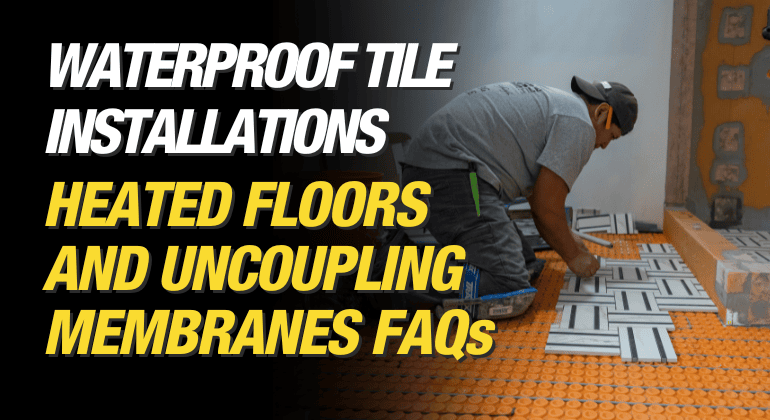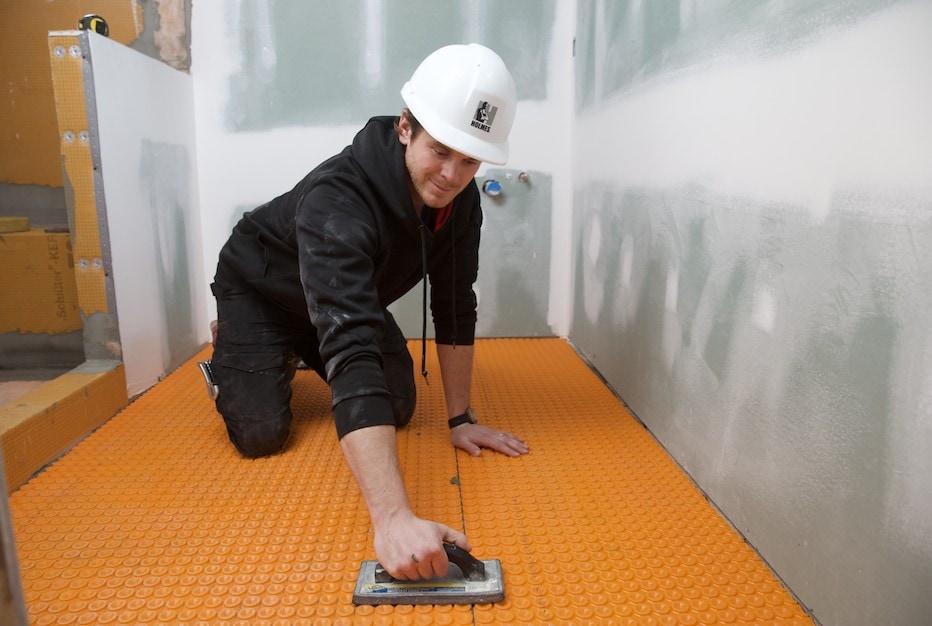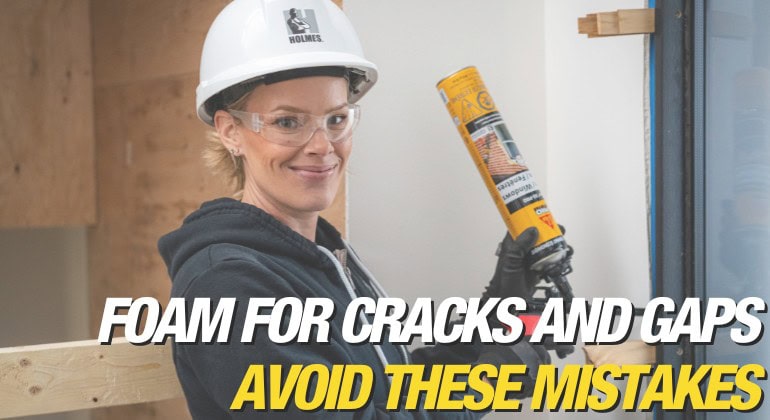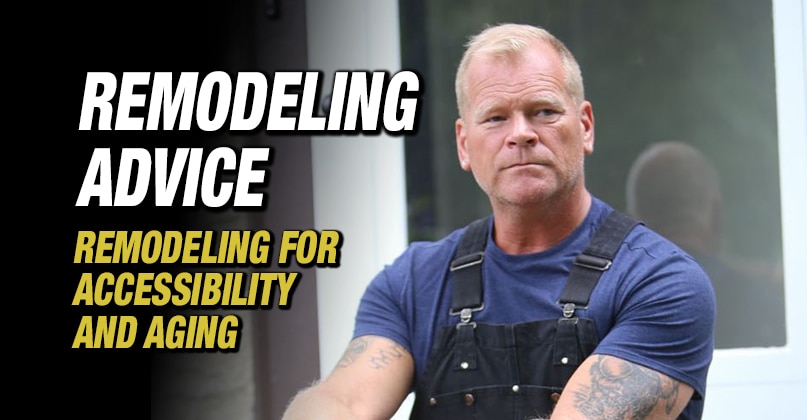Dream of a career where your skills bring joy, enable freedom, and create unforgettable memories? The thriving recreational vehicle (RV) industry offers just that! It’s more than fixing vehicles; it’s...

Heated Floors And Uncoupling Membranes: Questions Answered
By Mike Holmes
Mike’s Advice / Bathroom Renovation
Thursday, August 22nd, 2024 @ 11:09am
What Should You Know About Uncoupling Membranes
My mission has always been to educate homeowners so they can become well-informed. I love the fact that my fans are listening and are engaged with our shows. When it comes to your bathroom, waterproofing is non-negotiable. I’ve seen too many homeowners deal with cracked tiles because they skipped a step. Installing heated floors and uncoupling membranes not only adds comfort but also provides that extra layer of protection your home needs.
One product I get asked about a lot is Schluter or “the orange stuff” as some of you like to refer to it. My family and I love the high-quality product lines of Schluter Systems. They are the best on the market and we trust them on all our projects. They are great for tiled floors, preventing cracked tile and grout, and providing waterproofing too. I love that because it’s an investment that you know will last for years to come.
Here I’m answering some of the top questions we’ve received about the Schluter DITRA and DITRA-HEAT uncoupling membranes, including their newest Peel & Stick version.
What is an “uncoupling membrane”?
Many homeowners dream of beautiful tile floors, but cracked tiles can quickly turn that dream into a costly headache. One way to prevent this common problem is by using an uncoupling membrane. We use Schluter DITRA and DITRA-HEAT on all our projects.
Schluter DITRA uncoupling membrane is specifically designed for ceramic and stone tile installations. It is installed between the subfloor and the tiles and acts as a buffer, absorbing movement and stress that could otherwise cause cracks to appear on the tile surface.

We also love installing heated flooring and Schluter DITRA-HEAT is the perfect product.
While you would commonly use this on bathroom tiled floors, it can also be used in entranceways and kitchens or any tiled floor in the house.
Why should you use an uncoupling membrane?
Think of your subfloor as a living, breathing entity – it can expand and contract due to temperature changes or moisture fluctuations. Uncoupling membranes act as a buffer zone.
Between the tile and substrate, an uncoupling membrane creates a layer that allows independent movement between the two surfaces. The uncoupling membrane stops substrate expansion and contraction from causing tension, movement, and fractures in the tile and grout.
RELATED
When should an uncoupling membrane be used?
In a nutshell, any tiled floor needs an uncoupling membrane to provide longevity and durability, and ultimately prevent cracked tiles and grout. The other consideration is in areas where moisture is frequently present, such as open-concept bathrooms.
With a few extra steps, DITRA and DITRA-HEAT can provide waterproofing, so they can be a nice option for bathrooms, laundry rooms, or mudrooms where water may be a concern.

The membrane’s job is to keep moisture and water from penetrating the flooring, reducing the possibility of mould and mildew growth and water damage.
RELATED
Should you use an uncoupling membrane on a concrete floor?
DITRA-HEAT-DUO is ideal for a concrete floor application, like in a basement. The thermal fleece backing reduces heat loss to the substrate with up to 70% faster heat-up times over concrete. Plus, it helps protect against mould and mildew.
Does the Schluter DITRA uncoupling membrane prevent cracking?
Short answer is YES! Schluter DITRA uncoupling membrane prevents the movement between the substrate and the tile, preventing it from cracking. Think of DITRA as a highway that allows cars to get out without causing traffic.
RELATED
How Do You Prevent Tiles From Cracking
Is the Schluter DITRA uncoupling membrane worth the extra investment?
YES! I’ve used and trusted Schluter products for years and in turn, my son, Michael and daughter, Sherry do too. Compared to other options, Schluter DITRA provides better protection against water damage, mould and mildew. Also, DITRA reduces the tile and floor thickness to about 1/8 of an inch.
What is the difference between DITRA and DITRA-HEAT?
Schluter DITRA is an uncoupling waterproof membrane that allows the tile layer to move (contract and expand) independently of the substrate.
Schluter DITRA-HEAT has the same function but offers the additional benefit of accommodating heating cables, to create a luxurious and comfortable space. Heating cables can be placed across the entire floor, or in specific zones like in front of your vanity or toilet, so it’s very customizable to your specific space and needs.
RELATED
Are DITRA and DITRA-HEAT waterproof?
Yes – when the seams are covered with KERDI-BAND and installed correctly it provides a waterproof layer. It’s essential that the correct installation methods are adhered to for optimal performance.
What’s the difference between DITRA-HEAT and DITRA-HEAT Peel & Stick?
DITRA-HEAT Peel & Stick membranes provide the same great in-floor heating system as DITRA-HEAT but in a convenient peel-and-stick version. The system offers the same great benefits as uncoupling, waterproofing, vapour management, and support to ensure a long-lasting installation.
Both options are available in both rolls and sheets. The peel & stick option has a self-adhesive backing that eliminates the need for thin set when installing the membrane, making the process quicker, easier and cleaner.
How easy is it to install the DITRA Peel & Stick?
We love the Schluter DITRA HEAT Peel & Stick. Why? because the peel-and-stick version makes it much easier and quicker to install, as the self-adhesive backing eliminates the need for mortar at this stage of application.
Simply peel back the transparent release film from the fleece side of the membrane to expose the layer of self-adhesive and embed it onto the substrate. The membrane is easily moved for an exact fit until firm pressure is applied.

PRO TIP: For hard-to-bond substrates use PRIMER-U for extra adhesion
How long does it take to wait before tiling over DITRA?
There’s NO wait time – that’s what cuts down on the installation time. This is perfect as we work hard to get our projects completed in as short of a time as possible to give the homes back to their homeowners.
Can you use DITRA-HEAT in a shower?
Yes, you can use any of the DITRA-HEAT membranes in the shower including DITRA-HEAT Peel & Stick AS LONG AS it is covered in KERDI waterproofing membrane and properly installed.
A dedicated heating cable is recommended in the shower area to allow for simple disconnection without an impact on the bathroom floor heating if the shower heating cable is damaged and unable to be repaired.
Check out this video on installing DITRA-HEAT in the shower.
RELATED
Curbing the Curb: Pros And Cons to Building a Curbless Shower
Can you use different types of flooring instead of tiles with a DITRA-HEAT heated floor system?
Yes, DITRA-HEAT can be used with different types of flooring. This includes engineered wood, vinyl, and linoleum. WPC/LVT/LVP, SPC tile/plank and laminate flooring can also be used over DITRA membranes for added protection.
I hope I’ve managed to answer some of your questions regarding the Schluter DITRA, DITRA-HEAT, and DITRA-HEAT-PS. Schluter has a fantastic resource section on their website with videos so I encourage you to check them out. Remember tiling is difficult and takes experience and skill. If you are not experienced then I suggest you hire a pro.
*Disclaimer: I only recommend products I would use myself and all opinions expressed here are our own. This post may contain affiliate links.
RELATED
19 Biggest Home Renovation Mistakes to Avoid
How To Renovate a Small Bathroom
9 Must-Have Design Features For Your Next Bathroom Renovation
The Ultimate Reno Guide: Top 10 Home Improvement Products In 2023







